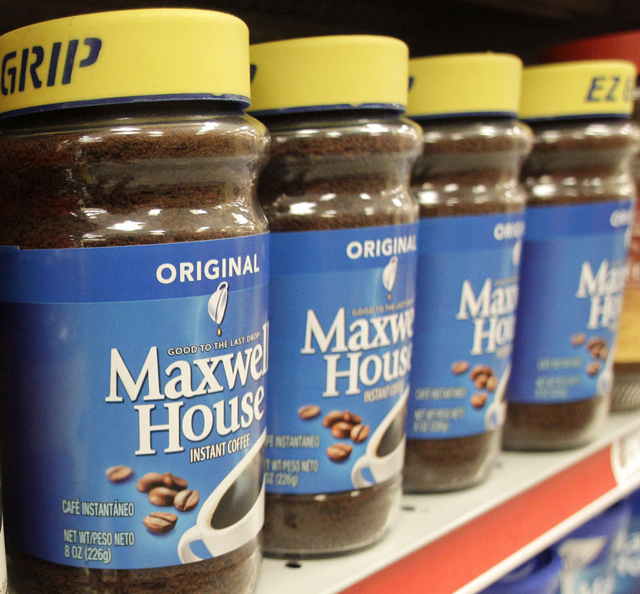WASHINGTON — If you’re angry that Wall Street speculators have been driving up the price you pay for gasoline, these same big financial investors now are pushing up the price of your cup of joe.
Consumers have seen whopping increases this year in the price of a can of ordinary coffee, whether it’s a generic store brand or better-known ones such as Folgers and Maxwell House. Since spring, coffee has been selling at $7 to $8 a can in many parts of the country, or about twice the price of a gallon of gas.
SPECULATORS BLAMED
The retail price of coffee in July was up 20.7 percent over the same month last year, according to the Bureau of Labor Statistics, which tracks changes in grocery store prices. Big coffee marketers have trimmed prices a bit for consumers in recent weeks, but the price of contracts for future delivery of coffee continues to rise unabated.
What gives?
Coffee-industry veterans blame financial speculators. They say they’re taking advantage of global supply hiccups to drive up coffee prices by adding volatility to the trading of contracts for future delivery of coffee. It’s not as debilitating to family income as high crude oil prices, but the phenomenon is the same.
“It’s definitely not purely supply and demand; it’s way too volatile,” said Shawn Hamilton, the vice president of operations and a veteran coffee buyer for Java City in Sacramento, Calif., a national wholesaler of coffee and a midsize regional coffee roaster.
Experts say that global consumption of coffee is up, particularly in China and coffee-producing Brazil. There’s also been a weather-related dip in production from coffee-rich Colombia. These underlying supply-and-demand factors do justify higher coffee prices, just not this high.
The hiccup in production and rising demand set the stage for Wall Street speculators – many of them big hedge funds that invest for the ultra-wealthy – to flood into commodities markets and speculate on contracts for future delivery of coffee.
‘NOT A TRUE COFFEE MARKET’
The net result distorts the price of coffee. The price of a futures contract for 37,500 pounds of coffee rose by more than 40 percent last year, and has gone up by more than 57 percent this year through Aug. 19.
“It’s not a true coffee market anymore, where the laws of supply and demand hold forth,” said Danell Seda, a trader for Walker Coffee Trading in Houston, an importer of green coffee beans that supplies the specialty coffee market.
Howard Schultz, the CEO of Starbucks, complained in March that he had no trouble obtaining coffee beans – there’s no supply shortage – and that speculators were to blame for soaring coffee bean prices on commodity exchanges, which had reached $2.96 a pound, their highest levels in 34 years, though not when adjusted for inflation. The company didn’t make an executive available for this story.
Just a few months earlier – in a letter Dec. 14 to members of the Commodity Futures Trading Commission – the chief procurement officer for Dunkin’ Donuts, Ed O’Rourke, called for a curb on financial speculators.
“Something as simple as a good cup of coffee at a fair price is under threat today because of intense pressure by hedge funds and other speculators,” he wrote.
COMMISSIONER AGREES
At least one CFTC commissioner now agrees.
“Speculators have influenced coffee prices in commodity markets in a way that isn’t consistent with the fundamentals of supply and demand,” Bart Chilton said. He’s prodded fellow CFTC members to find a way to rein in excess speculation in coffee and other commodities.
The National Coffee Association – the industry’s trade group – has come to no conclusion about volatile prices.
“Some people think the hedge funds are more to blame; others think it’s supply and demand or the weather,” spokesman Joe DeRupo said. “Everyone has their own hypothesis.”
Another high-level CFTC official, requesting anonymity in order to speak freely on a sensitive issue, acknowledged that the agency is unable to decipher how much coffee futures trading is being done by speculators versus those who are legitimately hedging against price shifts.
What’s not in dispute is that from June 2010 through last December, coffee leapt from about $1.35 a pound on commodity exchanges to around $2.17, a 61 percent increase. It peaked above $3 last spring.
Send questions/comments to the editors.



Success. Please wait for the page to reload. If the page does not reload within 5 seconds, please refresh the page.
Enter your email and password to access comments.
Hi, to comment on stories you must . This profile is in addition to your subscription and website login.
Already have a commenting profile? .
Invalid username/password.
Please check your email to confirm and complete your registration.
Only subscribers are eligible to post comments. Please subscribe or login first for digital access. Here’s why.
Use the form below to reset your password. When you've submitted your account email, we will send an email with a reset code.